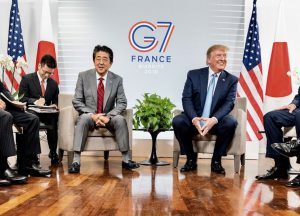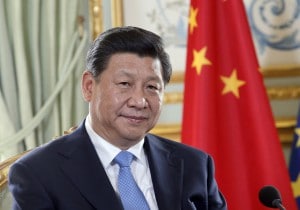
Japanese Prime Minister Shinzo Abe and President Donald Trump at the G7. The deadline has passed for Trump to levy tariffs on Japan and the EU.
President Donald Trump once said “trade wars are easy to win,” something that has proved questionable considering the ongoing battle with China. Now, it appear he may have lost the ability to trigger another trade war with Europe and Japan over imported cars and car parts.
Even before winning the White House, Trump indicated he might move to restrict the import of foreign-made cars, even suggesting he’d like to see Mercedes products vanish from the streets of New York. In office, he ordered an investigation by the U.S. Commerce Department which subsequently ruled that Japanese and European autos and auto parts posed a danger to national security – something that allowed the president to impose tariffs of up to 25%.
But, under Section 232 of the Trade Expansion Act of 1962, he had only until last Thursday to move on the Commerce Dept. report. A U.S. trade court ruling that was issued on Monday indicates the president’s authority to impose sanctions has lapsed – though he could seek alternative routes to restrict auto imports, as he has done with China.
(With China trade deal again delayed, Trump expected to hold off on new Japan, EU tariffs)
Whether the president’s inaction on Section 232 tariffs was inadvertent or intentional isn’t certain. The administration has been struggling to end the ongoing dispute with China, the president recently announcing that the signing of a limited agreement with the Asian economic powerhouse has been delayed, possibly until next year.

European Commission President Jean-Claude Juncker, left, and President Donald Trump met a while ago to discuss a new trade deal.
The dispute with China has begun to create measurable problems for both countries, among other things limiting the export of U.S.-made cars – such as the Ford Mustang and the BMW X5 — and car parts. And China’s cut in the purchase of American agricultural goods has hurt farmers across the country.
Commerce Dept. Secretary Wilbur Ross appeared to be trying to downplay the possibility of a new trade war during an appearance on Bloomberg Television earlier this month, where he said, “Our hope is that the negotiations we’ve been having with individual companies about their capital investment plans will bear enough fruit that it may not be necessary to put the 232 fully into effect, may not even be necessary to put it partly in effect.”
The president in September signed a limited trade agreement with Japan during a White House meeting with that country’s Prime Minister Shinzo Abe – but autos were not included in the deal. There have been ongoing negotiations with Europe over automotive goods and other trade issues in recent months, as well, aimed at diffusing the issue.
(Threat of auto tariffs could scuttle Trump’s trade deal with Japan)
The president originally had until last May to act on the Commerce Dept.’s Section 232 ruling, but he imposed a 180-day delay allowing for further negotiations. TheDetroitBureau.com last week reported that there were signs the White House would again move to delay any decision on tariffs but, Reuters reports, with no specific action taken by last Thursday’s deadline, the president has lost the authority to specifically use the Commerce study as grounds for new tariffs, now or later.
The Court of International Trade’s ruling, issued on November 15 but just published on Monday, marked the second time it has weighed in and limited Trump’s authority in a Section 232 case. It previously ruled the president had let the clock run out when trying to impose 50% sanctions on imported Turkish steel.

Representatives of Chinese President Xi Jinping has been engaged in trade discussions with President Trump’s team for months.
“Although (Section 232) grants the President great discretion in deciding what action to take it cabins the President’s power both substantively, by requiring the action to eliminate threats to national security caused by imports, and procedurally, by setting the time in which to act,” CIT judges Claire Kelly and Jane Restani wrote in their latest ruling.
The White House could seek to overturn that decision or find alternative ways to impose new sanctions on European cars and car parts. Nonetheless, the door appears to be closed, for now, on using the Commmerce Department study to justify such a move.
(Trump Says No Tariffs on Japanese Autos — For Now)
“I don’t see the law as giving the president any options other than take action against imports or determine to take no action and the case is closed,” Jennifer Hillman, a Georgetown University Law School professor and a former World Trade Organization judge, told Reuters.
